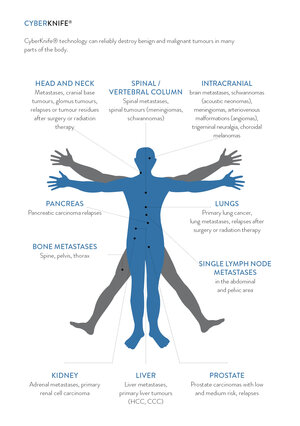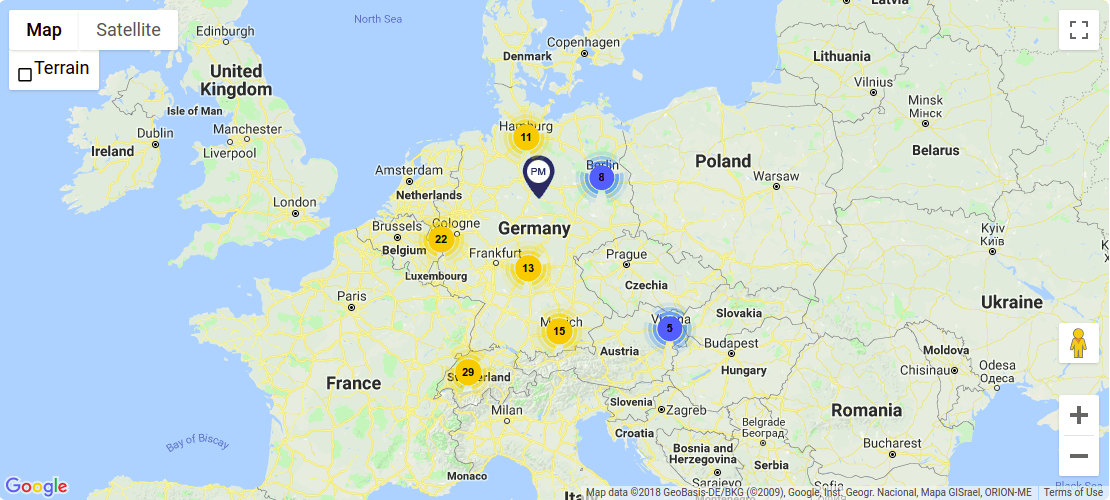CyberKnife Center of Central Germany – The Specialists in Radiosurgery & Precision Radiotherapy in Erfurt
Treatment focus
- Head and neck: Metastases, skull base tumours, selected ENT tumours, choroidal melanomas, and trigeminal neuralgia
- Brain: Brain metastases, acoustic neuroma, meningiomas, arteriovenous malformations (angiomas), and pituitary adenomas
- Lungs: Primary lung carcinomas, lung metastases, recurrence treatment
- Pancreas: Selected cases of pancreatic cancer
- Spine: Spinal metastases, meningiomas
- Prostate: Prostate carcinomas with low & medium risk, treatment of recurrences
- Bone metastases: Spine, pelvis, thorax
- Kidney: Primary renal cell carcinomas, adrenal metastases
- Liver: Liver metastases, primary liver carcinomas (HCC, CCC)
- Lymph node metastases: Abdomen & pelvis area
Contact
CyberKnife Centrum Central Germany
Institute for High Precision Radiation (Radiosurgery/Hypofractionated Radiosurgery)
In the main building of the Helios Hospital Erfurt, Nordhäuser Straße 74, D-99089 Erfurt
P: +49 361 6763 91 66 F: +49 361 781 67 19
Consultation Hours:
By appointment

More Information
Card
Since 2012, the CyberKnife Center of Central Germany has been treating benign and malignant tumours in all body regions as well as selected other diseases using CyberKnife technology at the Helios Clinic in Erfurt.
The painless and completely outpatient treatment is performed with highest precision by using the CyberKnife device and impairing patients only minimally or not at all. Based on strict criteria, the doctors of the CyberKnife Center determine whether and how radiosurgical treatment is applied.
CyberKnife – the “Invisible Scalpel”
‘CyberKnife’ is a radiosurgical instrument developed in the US. With the CyberKnife, photons from a linear accelerator are directed at the target tissue by a freely movable robotic arm while treatment is guided by an image. This means, possible movements are registered in continuous real-time imaging and the robotic radiotherapy can be adjusted accordingly. High-resolution imaging is required for planning the therapy. Based on this fact, an individual radiation plan is determined for each patient, taking into account size, shape, and position of target tissue cells as well as surrounding structures to be protected.
Advantages of the CyberKnife Process
- Outpatient therapy
- Painless and non-invasive
- Availability of treatment options for patients considered to be beyond a cure
- Possibility of re-radiation and treatment of radiation-insensitive tumours
- Low complication risk
- Short treatment duration
- Immediate return to the rhythm of everyday life
Treatment Spectrum and Requirements
With CyberKnife, both benign and malignant tumours can be irradiated when appropriate, in addition to specific diseases in almost all regions of the body. Therefore, this method can be a non-invasive alternative or supplement to other therapies and sometimes, it can be a new treatment option. The technology ensures an extremely high precision output, so even difficult-to-reach areas are radiated with maximum accuracy, thus protecting surrounding healthy tissue as much as possible.
A prerequisite for the applicability of CyberKnife radiosurgery is for treated areas not to exceed a particular size and number. In addition, affected regions must be easily distinguished from healthy tissue. Aspects related to the patient and his particular situation come into play as well. For example, these conditions are fulfilled, if surgery or conventional radiotherapy is generally not possible or sensible for the patient. The explicit patient’s wish may also be a criterion for the CyberKnife therapy alternative.
Precision Radiotherapy in Head and Body
- Radiosurgery (RS) is a high precision radiation in sub-millimetre range, usually a one time high ablative dose, followed by a steep dose drop at the tumour margin for highest possible protection of healthy connecting tissue areas. Only in exceptional cases, a safety border needs to be radiated. This highest precision defined for the RS (approx. 0.3 mm) justifies the often criticised term radiosurgery.
- Ideal for a one-time RS are the smallest possible, sharply defined areas without tumour infiltration into the surrounding healthy tissue.
- With the CyberKnife, there is no longer any need to screw a stereotactic frame to the head. Radiosurgical treatments can also be performed fractionally with sub-millimetre precision. For this purpose, the term hypofractionated radiosurgery (multisession radiosurgery = msRS) was established.
- The CyberKnife can be trained for individual breathing with the so-called "tracking” in order for even moving tumours to be radiated precisely with a lower safety margin.
- The CyberKnife locates findings to be treated (target volume) with sub-millimetre precision. This accuracy is monitored in real time during treatment and corrected if necessary.
- Relevant is not only the technical equipment but also the experienced interdisciplinary team continuously working together and training new employees on a long-term basis. As a result, radiation therapists, medical physicists, and neurosurgeons can increasingly learn from each other for the patient’s benefit. In Erfurt, this situation has been going on for 20 years now.
The Tumour Board
The doctors of the CyberKnife Center of Central Germany assess the radiological images and the medical history in advance. If treatment with CyberKnife is considered, a personal on site consultation and information session will follow. Opportunities and risks are explained, and questions are answered.
More specifically, tumours and metastases in brain and base of skull, spinal cord, as well as many different internal organs can be treated with the CyberKnife device. Additionally, benign arteriovenous malformations (congenital vascular malformation in the head region) and trigeminal neuralgia (pain syndrome of the face) can be cured.
CyberKnife Center of Central Germany – a Holistic Concept
In Erfurt, treatment and care is provided by a team of radiotherapists, specialized neurosurgeons, medical physicists, and medical-technical radiology assistants. Through the integration with the Helios Clinic Erfurt, cooperation with local specialists, interdisciplinary exchange, and transfer to other specialist departments, if necessary, is possible.
Further information is available on the website of the CyberKnife Center of Central Germany.
Curriculum Vitae
Dr Hans-Ulrich Herold
Specialist Physician in Radiotherapy – Chief Physician of the Center
| 1985–1992 | Studies of human medicine at the University of Leipzig and Medical Academy Erfurt |
| 1993 | Doctorate in medicine |
| 1993–1999 | Training as a specialist physician in radiotherapy at Erfurt Hospital |
| 1999–2003 | Work as specialist physician at the Clinic for Radiotherapy of Erfurt Hospital |
| 2004–2007 | Radiotherapist in a joint practice in Erfurt |
| 2008 | World tour |
| 2009–2012 | Chief Senior Physician at the Clinic for Radiotherapy at Bielefeld Hospital |
| 2012–2017 | Leading Physician in Radiotherapy at the CyberKnife Center in Erfurt |
| since 2017 | Chief Physician at the CyberKnife Center in Erfurt |
Dr Susanne Fichte
Specialist Physician in Neurosurgery
| 2000–2006 | Studies in human medicine at the University of Jena |
| 2007 | Doctorate in medicine |
| 2007–2014 | Training as a specialist physician in neurosurgery |
| 2015–2017 | Specialisation in radiosurgery and acquisition of the technical qualification |
| since 2017 | Leading physician in neurosurgery at the CyberKnife Center of Central Germany |
Dr Klaus Hamm
Specialist Physician in Neurosurgery
| 1973–1979 | Studies in human medicine at the Leipzig University and of the Medical Academy of Erfurt (MAE) |
| 1979–1983 | Training as a specialist for surgery at the MAE |
| 1982 | Doctorate in medicine |
| 1983–1987 | Training as a specialist physician in neurosurgery at the MAE |
| 1987 | Habilitation and appointment as Private Lecturer in 1993 |
| 1988–1999 | Chief neurosurgical senior physician and head of the neurosurgical intensive care unit of the MAE. Until 1994, Medical University of Erfurt, then Erfurt Hospital/Helios Clinic Erfurt |
| Since 1993 | Training in stereotactic neurosurgery and radiosurgery/stereotactic radiotherapy |
| 2000–2012 | Leading Physician in stereotactic neurosurgery and radiosurgery at the Helios Hospital Erfurt (Novalis Center) |
| 2012–2017 | Chief Physician at the CyberKnife Center of Central Germany in Erfurt |
| since 2018 | CA i. R. / consulting physician at the neurosurgery department of the CyberKnife Center |
Team

Dr Hans-Ulrich Herold
Chief Physician and Leading Physician of Radiotherapy and Radio-Oncology
Dr Susanne Fichte
Leading Physician of Neurosurgery
Dr Klaus Hamm
CA i. R. and Consulting Physician in Neurosurgery
Transport Connections
| Erfurt Central Station | 4 km |
| Airport Erfurt-Weimar | 6 km |
Information about Erfurt
Erfurt is the state capital of Thuringia and the largest city in the state with a population of just under 205,000. Important institutions include the university and the Catholic diocese with its cathedral, Erfurt Cathedral. The city also has a very large medieval old town centre.
The city's economy is characterised by administration and services; Erfurt is the city with the second largest trade fair in the new federal states after Leipzig and is also an important transport hub in the centre of Germany. Erfurt is also known for its horticulture and as a media centre.









